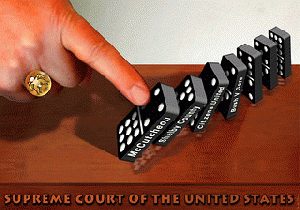
Allowing a corrupt presidential election to take place in .the world's premiere democracy. send the correct signal that the system will fail everywhere eventually.
(Image by DonkeyHotey) Details DMCA
As large pockets of the African-American population spend parts of the summer of 2014 reminiscing about the spirited songs and protest marches of half a century ago in Mississippi that are widely regarded as keystones in the so-called Civil Rights movement of the sixties, most American whites, even progressives, will look on quaintly and with detachment, as though passively watching the doings of Carnivale or the Mardi Gras -- it does not move them as an event of democratic solidarity and a celebration of inclusion. History and memory being what it is, few will venture beyond the vagaries of the Summer of Love, let alone drift back to the violent, revolutionary beginnings to the slow, on-going evolution of black freedom in America that took hold that summer.
And fewer people around the world will see it as a watershed moment that can help them understand their own nation's development in coping with the tolerant inclusion of the Other--the glue that makes civilization possible. Could the French not gain perspective on their historical treatment of Arab cultures by studying the riotous growth spurts in America? Could Czechs not gain insight into their treatment of gypsies? Do not the terrible insufficiencies of Mississippi in 1964 not have a blazing resonance in Australian Aboriginal relations? There was a time--and it was then--when JFK was a Berliner and MLK was the living gospel of hope, when all eyes were on America and her determination to break through the remaining chains holding back the final growth spurt of civilization. America the exceptional. Or so it seemed.
In a recent Guardian article, Errin Haines points out the obvious:
Unfortunately, the anniversaries of the watershed moments of the civil
rights movement are not embraced as thoroughly by white people in
America as they are by black people, despite the reality that these
events have benefited us all.
Yes, this is sad indeed, the begrudging tokenism, the sense that the hard-fought 'victories' of these years is seen by many whites with the same resentment as Affirmative Action. These early civil-rights actions, especially the voting-rights act, were the catalyst for the eventual near-revolutionary protests against violence in general and the war in particular that followed. You could even argue that it was the principal progressive outlet for middle-class whites, until the draft changed their focus and the 1970 Kent State atrocity forced progressives to put aside their sweet Age of Reasoning and inch closer to a more militant, black-driven 'by any means necessary' resolve.
But it should never be forgotten that though the events of Mississippi in 1964 were brutal and terrifying some mention is necessary, even in passing, of some of the bloodsweatandtears years that came before and made 'Freedom Summer' possible -- Rosa Parks in 1954, Emmett Till in 1955, Little Rock in 1957, Medgar Evers in 1963, MLK's Dream speech of 1963. All of these events built toward that tipping point momentum that made changes possible.
(Note: You can view every article as one long page if you sign up as an Advocate Member, or higher).




